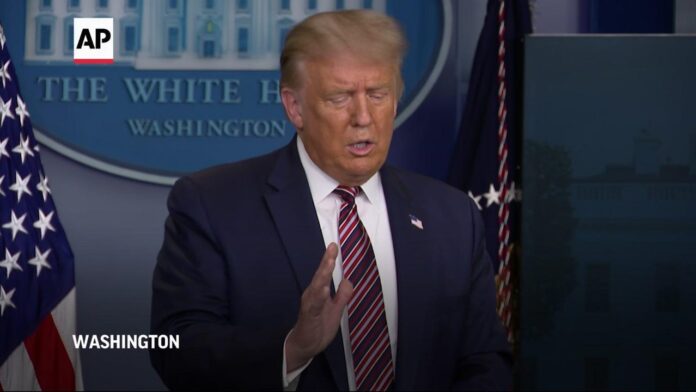Few Trump-era mysteries are as intriguing as what the 45th president said to Vladimir Putin in at least a dozen rambling, off-the-cuff calls and meetings over four years. Understanding what was said between the two could help illuminate whether Trump ever revealed sensitive information or struck any deals with the Kremlin leader that could take the new administration by surprise.
Now that President Joe Biden is in the White House, he can see for himself.
“They don’t need our approval to see those [records],” a former Trump White House official said, referring to the new Biden national security team. “Biden owns all the call materials. There is only one president at a time.”
The Biden White House did not comment on whether it had seen the content of the calls. But so far, at least, the National Security Council has not registered any complaints with their ability to access relevant call records from the previous administration.
“It is a national security priority to find out what Trump said to Putin” over his four years in office, said one former national security official who is close to the new president. “Some things, like what happened in some face-to-face meetings where no American translator or note-taker was present, may never be fully known. But I would be very surprised if the new national security team were not trying to access” the call records.
Trump closely guarded his private conversations with foreign leaders while in office, going as far as to have some hidden in the NSC’s top-secret codeword system to limit staffers’ and even cabinet members’ access and prevent leaks. Readouts of their calls would often come from the Kremlin first, or through Trump’s Twitter feed. But while the calls were not recorded, aides were typically still on the line and taking notes of what was said. The resulting loose transcripts are known as “memcons,” or memorandums of conversation.
Trump went to particularly great lengths to keep his in-person conversations with the Russian leader private, from confiscating his interpreter’s notes to forgoing American translators and notetakers altogether in their meetings. That desire for secrecy has extended even past his time in office. One former Trump official argued last week that records of Trump’s conversations with Putin, which often lasted an hour or more, should not be made available to his successor.
“There are certain things a president and his immediate staff should be able to hold privileged to do the work of government, without being subject to constant partisan gamesmanship,” said a second former Trump White House official.

Memcons, including Trump’s calls with Putin, are considered presidential records, and were not expunged before the 45th president left office, one former Trump White House official said. They were transferred to the National Archives and Records Administration at the end of Trump’s term, as is customary.
“Of course we didn’t delete anything and they would be in NARA and accessible,” the official said.
Kel McClanahan, executive director of the law firm National Security Counselors, agreed as a legal matter: “The only person who can claim executive privilege anywhere is the sitting president,” he said. “So there is literally no situation, nor could there be, where a former president could keep a sitting president from seeing something.”
Trump’s interactions with Putin and other Russian officials were certainly far from the normally carefully choreographed talks between world leaders — Trump early on in his tenure went as far as to disclose classified information to Russian diplomats in the Oval Office.
But former senior Trump advisers said it was rare that Trump would say anything to the Russian leader that he had not already said publicly (or would simply blurt out later while complaining about “the Russia hoax”). Marina Gross, who interpreted many of Trump’s calls and meetings with Putin, told associates that listening to their conversations often felt like eavesdropping on two friends chatting in a bar, according to one former official.
Still, the shadow diplomatic campaigns that flourished during the Trump administration are also top of mind for the Biden team as it works to understand the often disjointed policies of the last four years. Trump’s ill-fated call with Ukrainian President Volodymyr Zelensky, which led to his impeachment, was also hidden in the NSC codeword system, as were Trump’s calls with the Saudi royal family.
“This is much bigger than just Russia and Putin,” said another former Trump administration official. “It’s a problem across the board for the new team — basically, trying to find out, what did [Trump] promise people left right and center?”
John Eisenberg, the former top lawyer on Trump’s NSC who was involved in placing the president’s calls in the top-secret server, will now be one of Trump’s representatives handling records requests from the Biden White House, according to a person familiar with the matter.
The Biden NSC’s Russia review is being led in part by the council’s acting senior director for Russia and Central Asia, Eric Green, a veteran foreign service officer who for years specialized in Russia at the State Department. Green recently replaced Andrea Kendall-Taylor who left for personal reasons.
The Biden and Trump NSC staff consulted on a range of issues, including Russia, during the transition. And officials said it was generally thorough. In the days and weeks leading up to Biden’s inauguration, Trump’s outgoing NSC staff turned over binders full of material — including intelligence reports, strategy documents and information about ongoing operations — to facilitate a smooth transition.
The incoming national security team likewise grilled their predecessors on the obligations and commitments the Trump administration had made to both allies and adversaries, including to Russia. Some Trump staffers — primarily detailees from other federal agencies — remained on the NSC after Jan. 20 for the sake of continuity of government and have been helpful in answering the new NSC’s questions.
“We really tried hard to do it well,” said the second former Trump official, who participated in the process.







